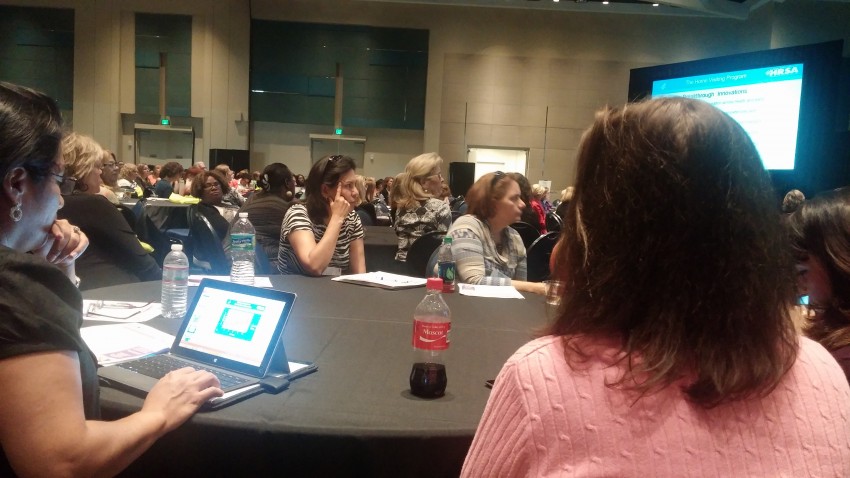The importance of a child's first 1,000 days
- October 21, 2015
- / Reggie Dogan
- / education

Sandy Lyons reads to VPK students at Trinity Learning Center. Trinity was among local childcare centers that participated in research
that Florida State University is doing on how to help young children become better readers. Photo credit: Michael Spooneybarger.
As a mother and grandmother, Barbara J. Pariente, chief justice of the Florida Supreme Court, knows what the first two years can mean to a child.
In her opening address to a jam-packed ballroom at the First 1000 Days Florida Summit, Pariente showed her passion for the cause.
“When I was asked to speak at this event, I wanted to shout from the rooftops, ‘Change the first 1,000 days and you can truly change a life,’” Pariente said. “Ignore the first 1,000 days and you consign a child to a potential lifetime of adversity.”
To build a stronger foundation in Florida and establish goals to move forward, more than 700 practitioners, policymakers, researchers, home visitors and other early childhood staff are gathering to learn more about why the first 1,000 days are so critical.
From Oct. 21-23 the conference offers an array of workshops, panel discussions and plenary sessions, focusing on issues related to a child’s first 1,000 days.
In recent years attention is increasingly focused on the most critical period of life — the first 1,000 days from pregnancy to the second birthday. It is considered a critical window of life that sets in motion a person’s intellectual development and lifelong health.
Among the goals of the Studer Community Institute is to improve the community’s quality of life, and providing quality education is an important part of it.
One of the key 16 metrics included in the Pensacola Metro Dashboard is kindergarten readiness. The first 1,000 days have a tremendous impact on a child’s early education. A growing body of research shows that success in kindergarten and primary school depends greatly on good nutrition fueling cognitive development during a child’s first 1,000 days.
In fact, addressing the malnutrition of the mother or child during this period — whether from a lack of food, poor dietary habits or nutritional deficiencies — can help overcome poverty-related issues and enhance childhood development.
To be sure, every child should have the right start to life during those important first 1,000 days, a critical time for the growth of bodies, the development of brains and the health of immune systems.
There really is no other time in a person’s life when nutrition has a more profound effect as in the 1,000 days from a woman’s pregnancy until her child’s second birthday.
“The first 1,000 days is the optimal time to promote development when it is the least expensive and the most effective,” Pariente said.
On the ballroom’s jumbo screen, Pariente flashed a picture of her 10 grandchildren. With a combination of biological and adopted grandkids, Pariente said she’s witnessed both the positive and negative sides of the first 1,000 days.
One grandchild experienced the ideal first 1,000 days, which included nurturing relationships in a healthy, supportive household. Another faced the trauma and adverse childhood experience associated with neglect, poverty and substance abuse.
“Prisons are filled with adults with mental health problems,” Pariente said. “The first 1,000 day is the best chance to turn around.”
Early childhood policies and investments to reduce risks and increase protective factors are key to supporting families in raising healthy and successful children.
Pariente outlined policy recommendations to improve the lives for young children:
- — Quality childcare
- — Early intervention
- — Medical home with mental health services
- — Early childhood court
Pariente said she has devoted years in the court system dealing with issues involving children and families.
Too many people, she said, don’t understand or appreciate the importance of a child’s early years.
Too often the investment in families with children under 3 years old is inadequate and costs more resources in the long haul, Pariente said.
Trauma and other adverse childhood experiences during this time have cumulative effects that threaten outcomes and success over a lifetime.
“To know that we can literally change the child’s brain and change her life, from one of despair and failing to hope and healing is a worthy investment,” Pariente said.
“As a grandmother, I get it. As an active member of my community, I get it," Pariente said. The most effective and the least expensive, if you heard that you would think we wouldn’t have to say anything more.”


 CivicCon launches with a look at good growth in cities
CivicCon launches with a look at good growth in cities
 Building stronger brains one baby, one parent at a time
Building stronger brains one baby, one parent at a time
 SCI debuts commercial on Early Learning City
SCI debuts commercial on Early Learning City
 Entrecon: World class speakers and an opportunity to sharpen skills
Entrecon: World class speakers and an opportunity to sharpen skills
 PYP Quality of Life survey 2017
PYP Quality of Life survey 2017
 EntreCon Pensacola 2016: A look back
EntreCon Pensacola 2016: A look back
 Leadership tip: getting better employee takeaways
Leadership tip: getting better employee takeaways
 Leadership tip: be interested instead of interesting
Leadership tip: be interested instead of interesting
 Leadership tip: delivering difficult messages
Leadership tip: delivering difficult messages
 Brain Bags boost Arc, Early Childhood Court programs
Brain Bags boost Arc, Early Childhood Court programs